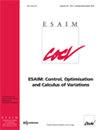动力系统集成的最优控制
IF 1.2
3区 数学
Q4 AUTOMATION & CONTROL SYSTEMS
Esaim-Control Optimisation and Calculus of Variations
Pub Date : 2022-03-30
DOI:10.1051/cocv/2023011
引用次数: 6
摘要
本文研究一类仿射控制系统的最优控制问题。在证明了所研究的最小化问题的适定性之后,我们建立了一个$\Gamma$收敛的结果,该结果允许我们用有限的大小递增的子集合序列代替原始的(通常是无限的)集合。涉及这些子集成的最优控制问题的解在原始问题的最小值的$L^2$强拓扑中提供近似。再次使用$\Gamma$-收敛论证,我们设法推导出具有端点代价的集成最优控制问题的最大原理。此外,在有限子集成的情况下,我们可以通过数值格式解决相关成本的最小化问题。特别地,我们提出了一种算法,该算法由近似代价泛函在允许控制空间上诱导的梯度场的子空间投影组成。此外,我们考虑了一种基于庞特里亚金极大值原理的迭代方法。最后,我们在$\mathbb{R}^2$中的一个线性系统集合上测试了算法。本文章由计算机程序翻译,如有差异,请以英文原文为准。
Optimal control of ensembles of dynamical systems
In this paper we consider the problem of the optimal control of an ensemble of affine-control systems. After proving the well-posedness of the minimization problem under examination, we establish a $\Gamma$-convergence result that allows us to substitute the original (and usually infinite) ensemble with a sequence of finite increasing-in-size sub-ensembles. The solutions of the optimal control problems involving these sub-ensembles provide approximations in the $L^2$-strong topology of the minimizers of the original problem. Using again a $\Gamma$-convergence argument, we manage to derive a Maximum Principle for ensemble optimal control problems with end-point cost. Moreover, in the case of finite sub-ensembles, we can address the minimization of the related cost through numerical schemes. In particular, we propose an algorithm that consists of a subspace projection of the gradient field induced on the space of admissible controls by the approximating cost functional. In addition, we consider an iterative method based on the Pontryagin Maximum Principle. Finally, we test the algorithms on an ensemble of linear systems in $\mathbb{R}^2$.
求助全文
通过发布文献求助,成功后即可免费获取论文全文。
去求助
来源期刊

Esaim-Control Optimisation and Calculus of Variations
Mathematics-Computational Mathematics
自引率
7.10%
发文量
77
期刊介绍:
ESAIM: COCV strives to publish rapidly and efficiently papers and surveys in the areas of Control, Optimisation and Calculus of Variations.
Articles may be theoretical, computational, or both, and they will cover contemporary subjects with impact in forefront technology, biosciences, materials science, computer vision, continuum physics, decision sciences and other allied disciplines.
Targeted topics include:
in control: modeling, controllability, optimal control, stabilization, control design, hybrid control, robustness analysis, numerical and computational methods for control, stochastic or deterministic, continuous or discrete control systems, finite-dimensional or infinite-dimensional control systems, geometric control, quantum control, game theory;
in optimisation: mathematical programming, large scale systems, stochastic optimisation, combinatorial optimisation, shape optimisation, convex or nonsmooth optimisation, inverse problems, interior point methods, duality methods, numerical methods, convergence and complexity, global optimisation, optimisation and dynamical systems, optimal transport, machine learning, image or signal analysis;
in calculus of variations: variational methods for differential equations and Hamiltonian systems, variational inequalities; semicontinuity and convergence, existence and regularity of minimizers and critical points of functionals, relaxation; geometric problems and the use and development of geometric measure theory tools; problems involving randomness; viscosity solutions; numerical methods; homogenization, multiscale and singular perturbation problems.
 求助内容:
求助内容: 应助结果提醒方式:
应助结果提醒方式:


